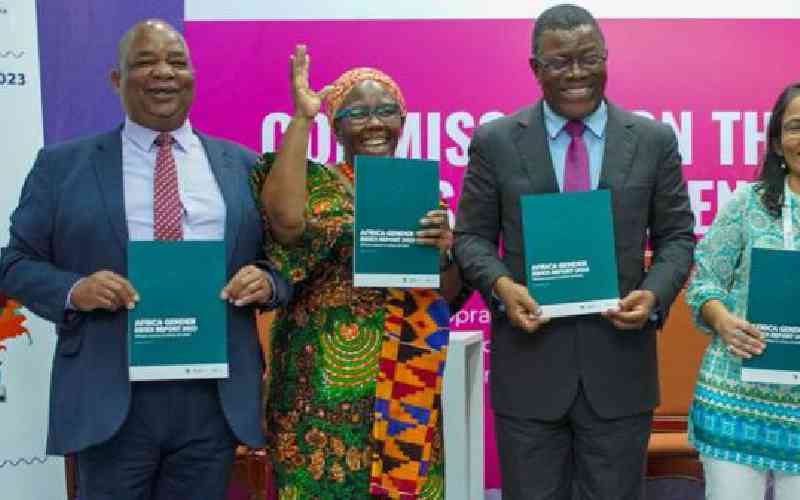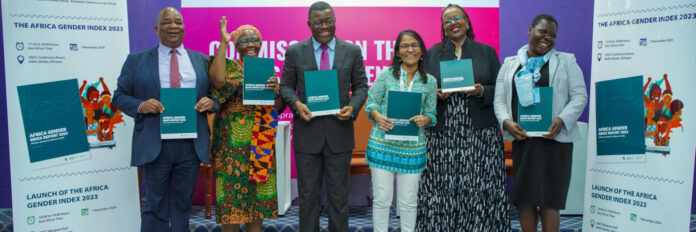By Gabs Mia
Addis Ababa, Ethiopia: Women in Africa are closer to reaching equality with men today than they were four years ago – but the continent is only halfway toward achieving gender parity.
That’s according to the Africa Gender Index 2023 Analytical Report released by the African Development Bank Group and the United Nations Economic Commission for Africa (ECA) on Friday.
Commenting on the Report’s findings, Nathalie Gahunga, Manager of the Gender and Women Empowerment Division at the African Development Bank said: “The report is a call-to-action for African governments to invest in Africa’s women and girls for sustainable and inclusive socio-economic development that works for all across the continent. This can be achieved through evidence-based, gender-responsive policies and programs. At the Africa Development Bank, we will continue collaborating with governments to address this important gap.”
Keiso Matashane-Marite, Chief of the ECA’s Gender Equality and Women’s Empowerment Section, said: “None of the targets for [United Nations] Sustainable Development Goal 5 on gender equality are on track. For instance, equal representation in parliaments won’t be reached until 2063. This is unacceptable. Africa cannot achieve sustainable prosperity if half its potential remains underutilized.”
Matashane-Marite urged policymakers to act decisively, using the Africa Gender Index 2023 Analytical Report findings to implement practical solutions and close gender gaps.
“The need for accelerated action is clear. By addressing these gaps, we can build a more inclusive and prosperous Africa for all” she urged.
Gahunga added “This effort required strong support in investing gender data and statistics for more evidence-based decision-making that leads to transformative public policy reforms.”
The report was unveiled at a joint press conference held on the margins of the Africa Pre-Commission on the Status of Women Consultation in Addis Ababa, ahead of the Ministerial Beijing Review. The Africa Gender Index 2023 Analytical Report measures gender equality across 54 African countries, scoring them between 0% or having the most gender inequality, and 100% – representing full equality.
Findings
The findings of the Africa Gender Index 2023 Analytical Report show that women in Africa score just 50.3% in equality across economic, social, and public representation areas, which is a slight improvement from the 48% score in 2019.
 Women in Africa are closer to equality in social areas, with a score of 98.3%. This includes access to education and healthcare, where girls now outnumber boys in graduation rates across primary, lower secondary, and upper secondary levels.
Women in Africa are closer to equality in social areas, with a score of 98.3%. This includes access to education and healthcare, where girls now outnumber boys in graduation rates across primary, lower secondary, and upper secondary levels.
The report found a 1.5% increase in women’s representation to 24.4% in 2023 compared to the last edition. However, women continue to be underrepresented in parliaments, ministerial positions, and private leadership roles.
The economic area has seen a decline in gender equality. Women’s economic parity dropped from 61% in 2019 to 58.2% in 2023. While men and women experienced economic setbacks during the reported period, women were disproportionately adversely affected.
Recommendations
Building on these findings, the Africa Gender Index 2023 Analytical Report recommends targeted actions to close the gender gap across three key areas.
One in the social sphere, the report urges countries to invest in overcoming barriers that prevent women from thriving in education, such as the burden of unpaid domestic work, early marriage, and inadequate sanitary facilities in schools.
Second on representation, the report suggests strong enforcement of gender quotas is recommended to increase the number of women in leadership roles, both in government and the private sector.
Third, in recognizing that women often achieve higher education levels than men, the report calls for tackling harmful gender norms and practices and addressing occupational segregation to boost women’s economic participation.














